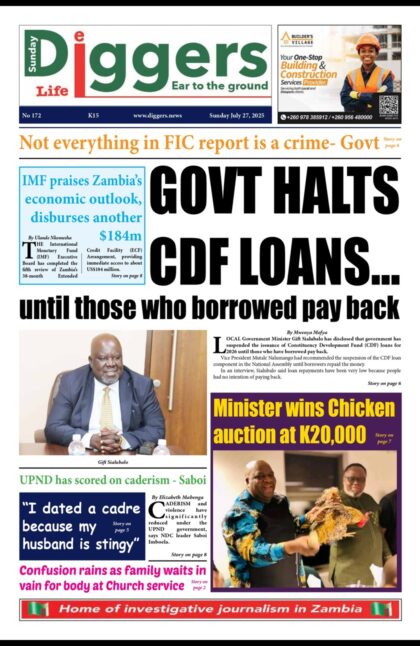FINANCE Minister Dr Bwalya Ng’andu says the country’s economy is expected to contract by as much as four percent this year.
And Dr Ng’andu says government is engaging the World Bank and the African Development Bank, side by side, on direct support towards the budget and support towards the COVID-19 pandemic as IMF talks come to a close.
Speaking in Parliament, Friday, when he was responding to debate on the Report of the Budget Committee, Dr Ng’andu said following the challenging economic performance this year, growth contraction of four percent was expected.
“The first challenge was at the end of the last quarter of last year, the country was faced with serious drought which disrupted agriculture and power in the southern part of the country and then in the first quarter of this year, the reverse happened in the northern part of the country we were faced with serious droughts which also were very disruptive to economic performance. Mr Speaker, economic performance in 2020 has been challenging, economic growth is expected therefore to be lower than the 1.4 percent growth recently announced for 2019. The economy is expected to contract by as much as 4 percent this year and this is in keeping with the global trend. Most of the countries on the globe are experiencing massive contraction in their economies in the course of this year,” he said.
“Now, in our case, mainly due to underperformance expected in most sectors, including construction, tourism, wholesale and retail trade as well as mining, considering several challenges that the sector is currently facing. The projected fall in tourism arrivals delayed execution in construction projected as well as significant reduction in consumer and investment spending are also expected to weigh down on economic activity. Mr Speaker, the COVID-19 pandemic has further exacerbated deterioration in economic performance with businesses reporting sharp declines in output and in orders amid falling consumer numbers amid company shutdowns. On the fiscal side, revenues are expected to decline by k12.79 billion while expenditures are poised to be higher at K9.7 billion. This will have spillover effects into the economy.”
He said despite the challenges the country was facing, resilience was expected in the agriculture and information technology sectors.
Dr Ngandu further told the House that the depreciation of the Kwacha had induced economic slowdown and increased dollar denominated expenditure with regard to debt servicing.
“Further, the depreciation of the kwacha has raised inflation to 15.9 percent and induced economic slowdown. It has also increased dollar denominated expenditure especially with regard to servicing of external debt obligations. Mr Speaker, I have noted a number of concerns and observations that have raised in the report following the review of the first quarter performance of the budget and these include: review of the 2020 national budget. Following poor quarter one performance on account of the deterioration of all economic indicators and the projected short fall of K14.8 billion in revenue of the 2020 projected figures; high debt levels with external debt portfolio of K11.2billion and domestic debt portfolio of K80.2billion; overly optimistic fiscal deficit of 5.5 percent of GDP which may not be feasible on account of COVID on the economy and programmed financing has been non-existent in quarter one of 2020, a trend which may continue, the mining fiscal regime that does not balance the interest of both government and mines. And I think, Mr Speaker, it’s important to understand that when we are talking about mining fiscal regime, we have to look at how well we can balance the needs of the country versus the needs of the mining companies themselves,” he said.
And Dr Ng’andu said government had engaged the IMF for support towards the impact of COVID-19.
“Mr Speaker, the government has engaged the IMF for support towards the impact of the COVID-19 pandemic. The government and the fund have therefore been holding discussions on the basis of Zambia’s applications to support under the rapid credit facility since the 2nd of July. The discussions will continue and hopefully will conclude this afternoon (last week Friday). Further, the government is side by side engaging the World Bank and the African Development Bank in direct support towards the budget and in discussion towards support towards the COVID-19 pandemic. Mr Speaker, the government is desirous in establishing debt sustainability, to this effect, government in December 2019 passed a number of decision to restore debt sustainability over the medium term, and these include a directive to impose a moratorium on commercial borrowing until debt is put on a sustainable path. Re-scoping some of the on-going projects, cancellation of signed but undisbursed debts and refinancing portions of debt, particularly, the commercial debts. To undertake this exercise, government has engaged legal and financial advisors to assist the republic in discussion with the creditors,” said Dr Ng’andu.



















